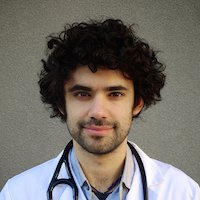It’s no coincidence that Dr. Felix Ankel (@felixankel) is Vice President for Health Professions Education at HealthPartners in Minneapolis. Dr. Ankel lives and breaths education and self-improvement. He has been active with CORD, SAEM, ACEP, ABEM, AAEM, among others. He is the recipient of the prestigious ACGME Parker J. Palmer Courage to Teach Award for his contributions to medical education and his work in competency based learning. Today he was generous enough to take some time to share not only insights about the logistics of working smarter but also an approach to the mindset for success.
-
Name: Felix Ankel, MD

- Location: Minnesota
- One word that best describes how you work: Networked
- Current job: VP for Health Professions Education, HealthPartners Institute
- Current mobile device: iPhone 4S
- Current computer: Macbook Air
What’s your office workspace setup like?
Macbook Air, iPad mini with Pandora playing Moby radio, iPhone, and old-school Franklin planner.
What’s your best time-saving tip in the office or home?
Failing to plan is planning to fail. I have moved from work-life balance to work-life integration. I plan for both during both.
What’s your best time-saving tip regarding email management?
E-mail management is a discipline, not a goal. Try to improve the process a little bit, every time.
What’s your best time-saving tip in the ED?
Communicate early, communicate often. Discuss thought processes with residents, with nurses, with patients. Communicating only when something is needed will lead people to disengage from you, mostly on a subconscious level.
What’s the best advice you’ve ever received about work, life, or being efficient?
- Manage narrative, delegate the rest
- Make yourself obsolete, not indispensable
- Give up power, maintain strength
- Give up authority, maintain accountability
- Give up resources, maintain responsibility
Is there anything else you’d like to add that might be interesting to readers?
These are more philosophical musings that have helped me work smarter over the years. Work is a discipline to be mastered rather than a task to be completed. Have a growth mindset and try to continuously learn, especially in domains outside of #meded. Key for me is constant reflective practice that includes journaling. Journaling has allowed me to “pet the lizard”, “feed the mouse”, and “hug the monkey” and move projects that may have brainstem or limbic system roots into the neocortex for higher-level impact. Journaling allows me to recognize the importance of Kairos aka “timing”, project sequencing and cadence, rather than Chronos aka “time” alone. Journaling also helps me identify and avoid non-helpful workplace patterns that impact efficacy such as the Karpman triangle.
My main work goal is to create value by moving from novice to expert in the domains of resilience, complexity, and context both individually and in groups (see Program Milestones Talk).
- From a resilience point of view I try to see how anything I do fits into my values, try to connect, try to bend, and try to engage in systematic reflective practice.
- In the complexity domain, I follow organizations such as the Plexus Institute and the Santa Fe Institutes.
- In the context domain, I build an org chart GPS and see how what I do fits into the bigger picture. I am a member of the American Evaluation Association (AEA), which has an active group looking at social network analysis.
Just like there is a triple aim in health care, there is a triple aim (quality, experience, stewardship) in #meded. The most efficient value creation occurs in networks. My roadmap for #meded value creation involves 3 Cs:
- (C)uration,
- (C)ommunities of practice
- (C)reation of value
My #meded value creation goals are attempts to improve patient health and well-being with patient, clinician, and learner support tools.
Successful organizations of the future will adapt and thrive in an organic, exponential world by incorporating the left and the right: e.g. left brain “facts” and right brain “story” and “design”, left heart “carrots and sticks” and right heart “autonomy, mastery, and purpose”, and left soul “six sigma, LEAN”, and right soul “appreciative inquiry”.
#FOAMed is a great example of this and its has been exciting to see the impact it has had on #meded.
Who would you love for us to track down to answer these same questions?
- Dr. Eric Holmboe @Boedudley
- Dr. Richard Horton @Richardhorton1
- Dr. Rob Cooney @EMEducation
Author information
The post I am Dr. Felix Ankel, VP for Health Professions Education at HealthPartners Institute: How I Work Smarter appeared first on ALiEM.



